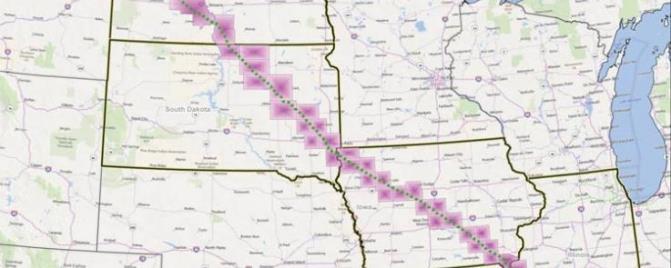Standing Rock Lawyers: More Uncertainty Over Post-Election Fate of Dakota Access Pipeline
The uncertain future of the Dakota Access Pipeline has become all the more uncertain following the Nov. 8 presidential election, said lawyers representing the Standing Rock Sioux Tribe in the DAPL case at a talk at Columbia Law School last week.
Two attorneys from Earthjustice who represent the tribe, Jan Hasselman and Stefanie Tsosie, came to Morningside Heights on Nov. 11 to speak about their case concerning the $3.8 billion crude-oil pipeline from North Dakota to Illinois. At issue is the section that goes through the land of the Standing Rock Sioux Tribe. The pipeline would pass under the Missouri River half a mile upstream of the Tribe’s reservation, where they say a spill would be catastrophic; and they say the pipeline would cut through culturally significant areas, like sacred sites and burial grounds.
This summer, the Tribe sued the U.S. Army Corps of Engineers—the federal agency that granted necessary permits for construction of the pipeline—arguing that in doing so the Corps violated federal statutes including the Clean Water Act, the National Environmental Policy Act, and the National Historic Protection Act. The case is currently in limbo, as the government decides whether to grant easement, allowing the project to move forward.
“This started out as a quixotic fight against a pipeline that no one had ever heard of, and we now find ourselves in the middle of a global movement about justice, sovereignty, and addressing the history of oppression of indigenous people,” said Hasselman. “ We are not just witnesses to history, we are actively participating in history right now. And everyone has an opportunity to participate in that history.”
When Hasselman visited the Standing Rock Sioux Reservation in North Dakota in April, three months before the Tribe filed a lawsuit, “there were like three tents—a couple young people there said they weren’t leaving until the pipeline stops.” Now, months later, thousands of protesters have joined in solidarity.
“The size of this movement cannot be overstated,” Tsosie said. “It’s enormous, it’s unprecedented; thousands of people from all over the world are joining and there are millions more watching. I assume that’s why you’re all here,” she said to the full lecture hall of Columbia Law School students.
Maia Hutt ’18, a member of Columbia’s Environmental Law Society and the Native American Law Students Association, introduced the attorneys. She emphasized the importance of these kinds of conversations in light of the presidential election results, noting that Donald Trump received donations from the company building the pipeline, and has spoken out against Native American sovereignty.
Three days after the lawyers visited the Law School, they received some positive news from the Army Corps, which decided to put pipeline construction on hold while they review the case further and consult with the Tribe. Yet the lawyers acknowledge the election results put a wrench in any good news that comes before January.
“Nobody really talked about what was going to happen if the election turned out the way it did,” said Hassleman. “What I expect to happen is the new administration will undo any good that comes out of this one—and I kind of expect something good to come out of this one on their way out the door—and we will be litigating that for a while. In the meantime, winter is coming in North Dakota—I think it will not get done this year as they had planned, but we’ll have to see.”
The company building the pipeline certainly hopes otherwise. On Tuesday, Energy Transfer Partners filed a lawsuit saying the U.S. Army Corp of Engineers has no right to delay easement to the project and urged the government to allow the pipeline construction to move forward immediately, citing millions of dollars in losses as a result of the delay.
And if the government does grant easement? Earthjustice will be back to fighting for a preliminary injunction, the lawyers said. “There is something to be said for standing up to injustice even when the path to fighting it is not immediately clear,” Hasselman remarked.
# # #
Posted November 16, 2016
